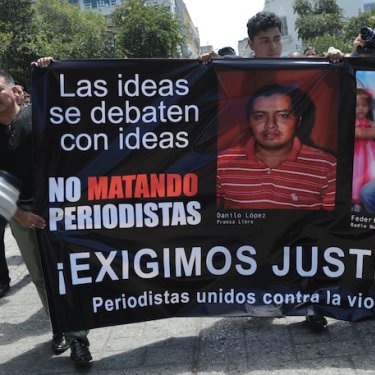Guatemala: Prospects for the media in a country torn by violence

As today (30 November) is celebrated as Day of the Journalist in Guatemala, Reporters Without Borders (RSF) looks back at what has been a particular violent year for the media in this Central American country but hails recent initiatives by the Guatemalan authorities to give journalist more protection.
With an annual murder rate of more than 30 per 100,000 inhabitants, according to the latest UN figures, Guatemala is one of the world’s ten deadliest countries and its media personnel are not spared.
RSF has registered no fewer than eight murders of journalists in 2016* although – because of the judicial system’s slowness and a reluctance on the part of officials to release information – a direct link between the murder and the victim’s work as a journalist is strongly presumed in only two of the cases.
According to a report on the human rights situation in Guatemala that the Inter-American Commission on Human Rights released at the start of 2016, more than 90 percent of murders (of all categories of persons) go unpunished in Guatemala.
The report says it is very hard for journalists to operate in Guatemala, especially those who try to cover stories linked to violence, organized crime and corruption. RSF has reached the same conclusion.
Guatemalan journalists are also the targets of intimidation campaigns and harassment – often by elected representatives or government officials – whenever their reporting is regarded as a nuisance. Media coverage is also undermined by censorship attempts, especially during election periods.
“On this special day, we offer our full support to Guatemala’s journalists who, in a particularly dangerous environment, courageously continue to do their job to report the news,” said Emmanuel Colombié, the head of RSF’s Latin America desk.
“We also urge the government to pursue its efforts to reinforce protection for media personnel, combat corruption and end impunity, which constitutes a major obstacle to freedom of expression in Guatemala.”
There have been some noteworthy and encouraging developments since Jimmy Morales was sworn in as Guatemala’s new president in January 2016, above all the imminent creation of a Programme for the Protection of Journalists that is the result of four years of work by government officials and 16 civil society organizations.
The programme, which President Morales is expected to personally launch in the next few days, includes measures for preventing threats to journalists and for providing emergency protection to those in danger.
Attorney General Thelma Aldana also announced at the start of November that a special unit that investigates crimes against journalists is to be overhauled and given more resources.
This overhaul could lead to the creation of a special prosecutor’s office for crimes against journalists. RSF hails the decision to provide investigators with more resources, as it essential to end the impunity that handicaps Guatemala.
Cerigua, an NGO that is RSF’s regional partner, noted in its annual report published on 28 November that attacks on the media have fallen in 2016, with 43 fewer cases than during the same period (January-November) in 2015.
The Cerigua report nonetheless highlights the increase in murders, the continuing violence and threats against journalists in the remotest regions, and the lack of action on the part of the judicial authorities.
Guatemala is ranked 121st out of 180 countries in the World Press Freedom Index that RSF published in April.
*The eight journalists murdered in Guatemala in 2016:
Note: Because of the lack of reliable information from the local police and judicial authorities, RSF had not been able to include all these cases in its Barometer.
- Mario Roberto Salazar, Radio Estéreo Azúcar manager, on 17 March in Asunción Mita (Jutiapa)
- Winston Leonardo Túnchez Cano, Radio La Jefa presenter, on 8 April in Escuintla (Escuintla)
- Diego Salomón Esteban Gaspar, Radio Sembrador presenter, on 30 April in Ixcán (Quiché)
- Víctor Hugo Valdez Cardona, Chiquimula de Visión presenter, on 7 June in Chiquimula (Chiquimula)
- Álvaro Aceituno López, Radio Illusión owner and presenter, on 25 June in Coatepeque (Quetzaltenango)
- Felipe David Munguía Jiménez, Canal 21 cameraman, on 4 September in Santa María Xalapán (Jalapa)
- Josué David Chamán, Radio Fuente de Vida presenter, on 11 October in Cobán (Verapaz)
- Hamilton Hernández Vásquez, Canal 5 presenter, on 5 November in Coatepeque (Quetzaltenango)



